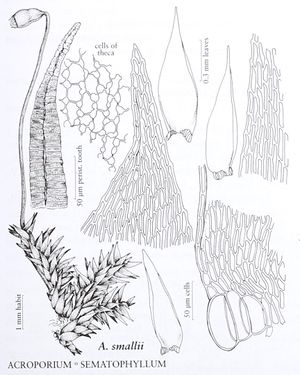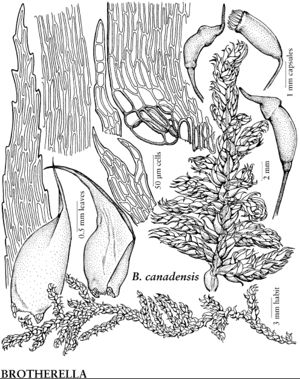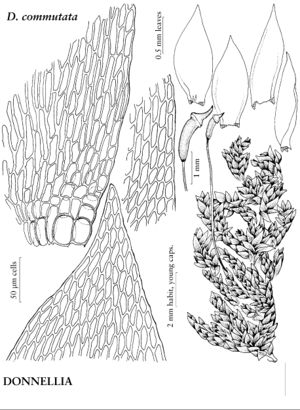Plants in small to large mats, usually golden to yellow-green, glossy or dull. Stems reddish green or sometimes red-brown, reclining or sometimes erect or arching, complanate-foliate or not, irregularly branched to pinnate; pseudoparaphyllia foliose or filamentous. Stem leaves erect-spreading, wide-spreading, falcate-secund, or homomallous, lanceolate to broadly ovate, tapering gradually or abruptly to apex; margins often toothed in acumen; apex acute to acuminate; ecostate or costa double, short; alar region well defined, pigmented, cells in proximal row strongly elongate and inflated, or not inflated and walls thicker; laminal cells usually flexuose, smooth or papillose (serially or 1-papillose); medial cells occasionally linear. Branch leaves smaller, narrower; alar cells less strongly differentiated. Specialized asexual reproduction by flagelliferous branches or axillary filamentous propagula. Sexual condition synoicous, dioicous, phyllodioicous, or autoicous. Seta reddish brown, red, or light brown, elongate, smooth. Capsule inclined or erect, cylindric or ovoid; exothecial cell walls usually collenchymatous, irregularly thickened; operculum usually rostrate; peristome double. Calyptra cucullate [mitrate].
Distribution
Nearly worldwide, predominantly tropical to temperate regions.
Discussion
Genera 40, species ca. 150 (9 genera, 15 species in the flora).
Sematophyllaceae are a reasonably coherent family, based on the genera in the flora area, but in the tropics the boundaries are more difficult to define.
Selected References
Lower Taxa
Illustrations
Key
| 1 | Laminal cells 1-seriate multipapillose | > 2 |
| 1 | Laminal cells smooth or rarely 1-papillose | > 3 |
| 2 | Stems complanate-foliate; alar cells enlarged or weakly inflated; sexual condition autoicous. | Taxithelium |
| 2 | Stems not complanate-foliate; alar cells inflated; sexual condition dioicous or phyllodioicous. | Wijkia |
| 3 | Alar cells enlarged, quadrate or rectangular, walls thick, middle lamella apparent. | Heterophyllium |
| 3 | Alar cells usually inflated, rounded or sometimes elongate, walls usually thin, middle lamella not apparent | > 4 |
| 4 | Alar region in 1 row, supra-alar cells not apparently differentiated. | Acroporium |
| 4 | Alar region in 1-several rows; supra-alar cells differentiated | > 5 |
| 5 | Capsules erect to suberect. | Donnellia |
| 5 | Capsules usually inclined | > 6 |
| 6 | Leaf margins entire. | Sematophyllum |
| 6 | Leaf margins serrate to serrulate near apex (rarely entire in Brotherella henonii) | > 7 |
| 7 | Stems complanate-foliate; leaves erect-spreading to falcate-secund, especially at shoot and branch apices. | Brotherella |
| 7 | Stems not complanate-foliate; leaves usually not falcate-secund | > 8 |
| 8 | Stem leaves ovate. | Hageniella |
| 8 | Stem leaves lanceolate to oblong-lanceolate, or if ovate, then apex long, abruptly piliferous | > 9 |
| 9 | Leaves strongly curved; alar cell walls thick, supra-alar cells many, quadrate. | Pylaisiadelpha |
| 9 | Leaves straight; alar cell walls thin, supra-alar cells few, quadrate to rhombic. | Wijkia |


